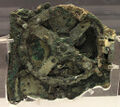Archimedes (nonfiction): Difference between revisions
No edit summary |
|||
| Line 17: | Line 17: | ||
== Fiction cross-reference == | == Fiction cross-reference == | ||
* [[ | * [[Anarchimedes]] - [[Supervillain (nonfiction)|supervillain]] and arch-enemy | ||
== Nonfiction cross-reference == | == Nonfiction cross-reference == | ||
Revision as of 08:34, 29 June 2016

Archimedes of Syracuse (/ˌɑːkɪˈmiːdiːz/; Greek: Ἀρχιμήδης; c. 287 BC – c. 212 BC) was an Ancient Greek mathematician, physicist, engineer, inventor, and astronomer. Although few details of his life are known, he is regarded as one of the leading scientists in classical antiquity.
Generally considered the greatest mathematician of antiquity and one of the greatest of all time, Archimedes anticipated modern calculus and analysis by applying concepts of infinitesimals and the method of exhaustion to derive and rigorously prove a range of geometrical theorems, including the area of a circle, the surface area and volume of a sphere, and the area under a parabola.
Other mathematical achievements include deriving an accurate approximation of pi, defining and investigating the spiral bearing his name, and creating a system using exponentiation for expressing very large numbers. He was also one of the first to apply mathematics to physical phenomena, founding hydrostatics and statics, including an explanation of the principle of the lever.
He is credited with designing innovative machines, such as his screw pump, compound pulleys, and defensive war machines to protect his native Syracuse from invasion.
Archimedes died during the Siege of Syracuse when he was killed by a Roman soldier despite orders that he should not be harmed.
In the News
The Antikythera mechanism is Anarchimedes' favorite toy.
Fiction cross-reference
- Anarchimedes - supervillain and arch-enemy
Nonfiction cross-reference
External links:
- Archimides @ Wikipedia
